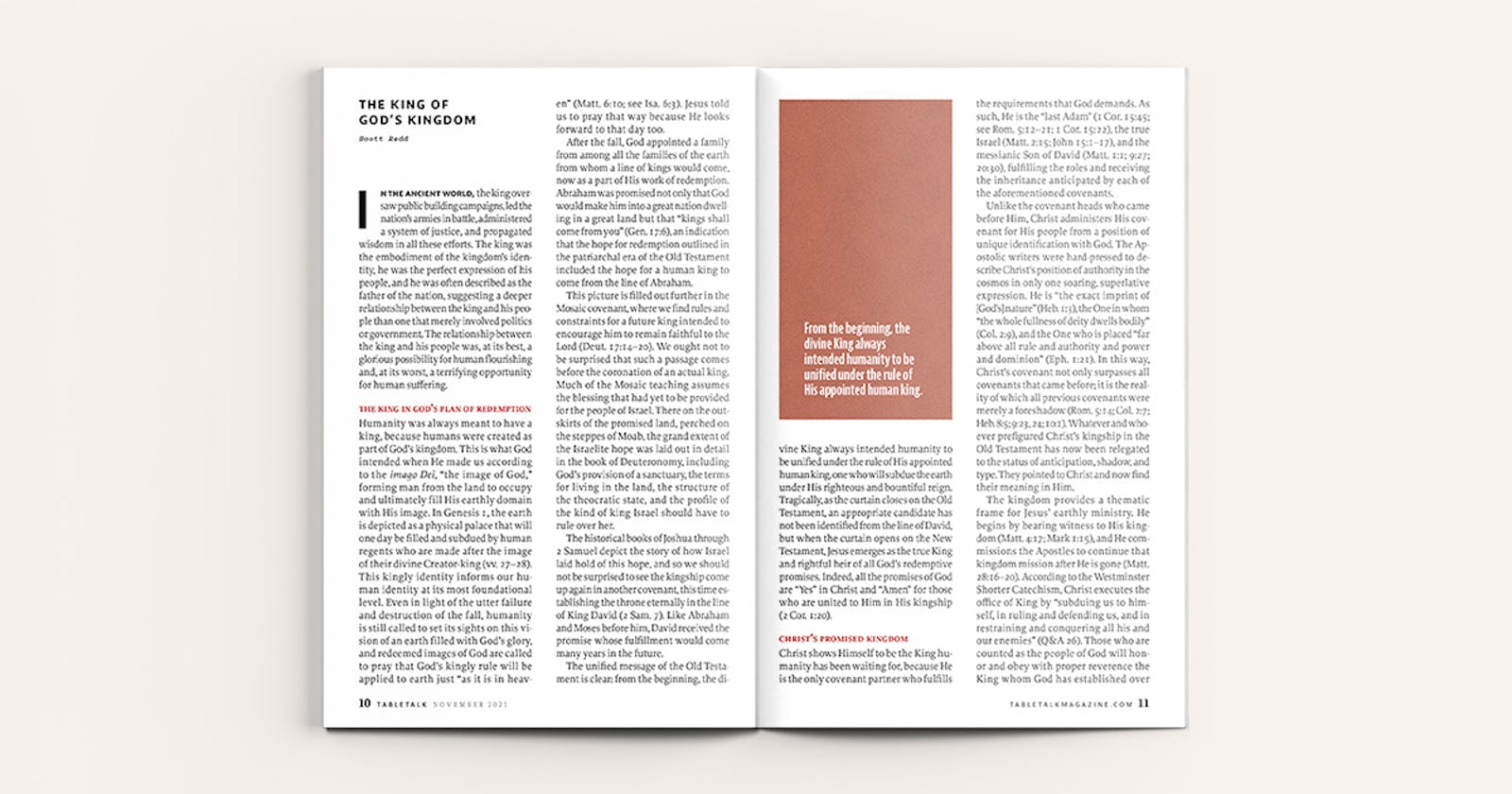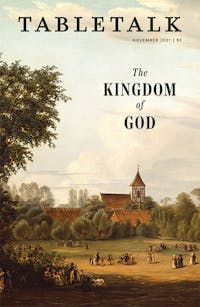
Request your free, three-month trial to Tabletalk magazine. You’ll receive the print issue monthly and gain immediate digital access to decades of archives. This trial is risk-free. No credit card required.
Try Tabletalk NowAlready receive Tabletalk magazine every month?
Verify your email address to gain unlimited access.
In the ancient world, the king oversaw public building campaigns, led the nation’s armies in battle, administered a system of justice, and propagated wisdom in all these efforts. The king was the embodiment of the kingdom’s identity, he was the perfect expression of his people, and he was often described as the father of the nation, suggesting a deeper relationship between the king and his people than one that merely involved politics or government. The relationship between the king and his people was, at its best, a glorious possibility for human flourishing and, at its worst, a terrifying opportunity for human suffering.
the king in god’s plan of redemption
Humanity was always meant to have a king, because humans were created as part of God’s kingdom. This is what God intended when He made us according to the imago Dei, “the image of God,” forming man from the land to occupy and ultimately fill His earthly domain with His image. In Genesis 1, the earth is depicted as a physical palace that will one day be filled and subdued by human regents who are made after the image of their divine Creator-king (vv. 27–28). This kingly identity informs our human identity at its most foundational level. Even in light of the utter failure and destruction of the fall, humanity is still called to set its sights on this vision of an earth filled with God’s glory, and redeemed images of God are called to pray that God’s kingly rule will be applied to earth just “as it is in heaven” (Matt. 6:10; see Isa. 6:3). Jesus told us to pray that way because He looks forward to that day too.
After the fall, God appointed a family from among all the families of the earth from whom a line of kings would come, now as a part of His work of redemption. Abraham was promised not only that God would make him into a great nation dwelling in a great land but that “kings shall come from you” (Gen. 17:6), an indication that the hope for redemption outlined in the patriarchal era of the Old Testament included the hope for a human king to come from the line of Abraham.
This picture is filled out further in the Mosaic covenant, where we find rules and constraints for a future king intended to encourage him to remain faithful to the Lord (Deut. 17:14–20). We ought not to be surprised that such a passage comes before the coronation of an actual king. Much of the Mosaic teaching assumes the blessing that had yet to be provided for the people of Israel. There on the outskirts of the promised land, perched on the steppes of Moab, the grand extent of the Israelite hope was laid out in detail in the book of Deuteronomy, including God’s provision of a sanctuary, the terms for living in the land, the structure of the theocratic state, and the profile of the kind of king Israel should have to rule over her.
The historical books of Joshua through 2 Samuel depict the story of how Israel laid hold of this hope, and so we should not be surprised to see the kingship come up again in another covenant, this time establishing the throne eternally in the line of King David (2 Sam. 7). Like Abraham and Moses before him, David received the promise whose fulfillment would come many years in the future.

The unified message of the Old Testament is clear: from the beginning, the divine King always intended humanity to be unified under the rule of His appointed human king, one who will subdue the earth under His righteous and bountiful reign. Tragically, as the curtain closes on the Old Testament, an appropriate candidate has not been identified from the line of David, but when the curtain opens on the New Testament, Jesus emerges as the true King and rightful heir of all God’s redemptive promises. Indeed, all the promises of God are “Yes” in Christ and “Amen” for those who are united to Him in His kingship (2 Cor. 1:20).
christ’s promised kingdom
Christ shows Himself to be the King humanity has been waiting for, because He is the only covenant partner who fulfills the requirements that God demands. As such, He is the “last Adam” (1 Cor. 15:45; see Rom. 5:12–21; 1 Cor. 15:22), the true Israel (Matt. 2:15; John 15:1–17), and the messianic Son of David (Matt. 1:1; 9:27; 20:30), fulfilling the roles and receiving the inheritance anticipated by each of the aforementioned covenants.
Unlike the covenant heads who came before Him, Christ administers His covenant for His people from a position of unique identification with God. The Apostolic writers were hard-pressed to describe Christ’s position of authority in the cosmos in only one soaring, superlative expression. He is “the exact imprint of [God’s] nature” (Heb. 1:3), the One in whom “the whole fullness of deity dwells bodily” (Col. 2:9), and the One who is placed “far above all rule and authority and power and dominion” (Eph. 1:21). In this way, Christ’s covenant not only surpasses all covenants that came before; it is the reality of which all previous covenants were merely a foreshadow (Rom. 5:14; Col. 2:7; Heb. 8:5; 9:23, 24; 10:1). Whatever and whoever prefigured Christ’s kingship in the Old Testament has now been relegated to the status of anticipation, shadow, and type. They pointed to Christ and now find their meaning in Him.
The kingdom provides a thematic frame for Jesus’ earthly ministry. He begins by bearing witness to His kingdom (Matt. 4:17; Mark 1:15), and He commissions the Apostles to continue that kingdom mission after He is gone (Matt. 28:16–20). According to the Westminster Shorter Catechism, Christ executes the office of King by “subduing us to himself, in ruling and defending us, and in restraining and conquering all his and our enemies” (Q&A 26). Those who are counted as the people of God will honor and obey with proper reverence the King whom God has established over them. A person cannot claim to be saved by some other means such as bloodline or moral achievement. He must accept the kingship of Christ. While many of the scribes and Pharisees of Jesus’ day no doubt resisted His teaching because they held to a form of legalism, it is also probable that many were simply not open to the idea of faith in someone like Jesus. Like the various rebellions in the Old Testament, their rejection of God’s appointed authority was rebellion against God Himself (Num. 16; John 8:19). It is not enough to embrace the law of Moses or the promises to David if one denies the kingship of Christ. As Jesus warns, “If you had known me, you would have known my Father also” (John 14:7).
To this day, Christ rules from the right hand of God the Father Almighty (Acts 5:31; Col. 3:1). As a result, the church of Christ does not look to a past saint as our covenant head; nor do we look to earthly relics of a previous generation, but rather we look to a living King as our primary and highest authority.
christ’s indwelling kingdom
The members of the universal church are deeply united with one another in Christ just as they are partakers of the fellowship between the Father, the Son, and the Holy Spirit. This spiritual fellowship enables believers, as individuals and as a corporate body, to be free of the corruption of sin that once governed them, while it also binds them one to another as the corporate body of Christ, the living sanctuary of God on earth, and the primary agent of the kingdom of Christ (Matt. 16:19). Christ initiated this aspect of His kingship in His prayer immediately before His betrayal:
“I do not ask for these only, but also for those who will believe in me through their word, that they may all be one, just as you, Father, are in me, and I in you, that they also may be in us, so that the world may believe that you have sent me. The glory that you have given me I have given to them, that they may be one even as we are one, I in them and you in me, that they may become perfectly one, so that the world may know that you sent me and loved them even as you loved me.” (John 17:20–23)
Christ surely leads His church, and the church is united in Him through the Holy Spirit, whom the Apostles tellingly refer to as “the Spirit of Christ” (Rom. 8:9; 1 Peter 1:11). The Spirit is not only effective in the regeneration of the believer, but He is also the regular sustenance by which the Christian lives as a citizen of Christ’s kingdom. Christ’s kingship has a two-way application. It establishes an appropriate relationship between God and His people because Christ is truly human, but it also establishes an appropriate relationship between His people and God because Christ is truly divine. Because of Christ, we can be united to God and enjoy all the blessings inherent in that union.
The character and work of the church are founded in Christ, enlivened in His Spirit, and directed toward His kingdom ends. He is in us as we are in Him. Christ is more than a saint in our tradition or a prophet of God; He is the fulfillment of the expectations of the Hebrew Scriptures. Our hearts are conformed to His kingly heart through the work of the Spirit in sanctification, and because of our spiritual union with Him we long for His kingdom to come in its fullness.
